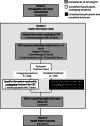Assessing how health information needs of individuals with colorectal cancer are met across the care continuum: an international cross-sectional survey
- PMID: 33109114
- PMCID: PMC7590465
- DOI: 10.1186/s12885-020-07539-0
Assessing how health information needs of individuals with colorectal cancer are met across the care continuum: an international cross-sectional survey
Abstract
Background: Studies evaluating health information needs in colorectal cancer (CRC) lack specificity in terms of study samples involving patients. We assessed how health information needs of individuals with CRC are met across the care continuum.
Methods: We administered an international, online based survey. Participants were eligible for the study if they: 1) were 18 years of age or older; 2) received a diagnosis of CRC; and 3) were able to complete the online health survey in English, French, Spanish, or Mandarin. We grouped participants according to treatment status. The survey comprised sections: 1) demographic and cancer characteristics; 2) health information needs; and 3) health status and quality of life. We used multivariable regression models to identify factors associated with having health information needs met and evaluated impacts on health-related outcomes.
Results: We analyzed survey responses from 1041 participants including 258 who were currently undergoing treatment and 783 who had completed treatment. Findings suggest that information needs regarding CRC treatments were largely met. However, we found unmet information needs regarding psychosocial impacts of CRC. This includes work/employment, mental health, sexual activity, and nutrition and diet. We did not identify significant predictors of having met health information needs, however, among participants undergoing treatment, those with colon cancer were more likely to have met health information needs regarding their treatments as compared to those with rectal cancer (0.125, 95% CI, 0.00 to 0.25, p-value = 0.051).
Conclusions: Our study provides a comprehensive assessment of health information needs among individuals with CRC across the care continuum.
Keywords: Care continuum; Colorectal cancer; Health information needs; Health seeking behaviors; Health survey.
Conflict of interest statement
The authors have nothing to declare.
Figures


References
-
- Bray F, Ferlay J, Soerjomataram I, Siegel RL, Torre LA, Jemal A. Global cancer statistics 2018: GLOBOCAN estimates of incidence and mortality worldwide for 36 cancers in 185 countries. CA Cancer J Clin. 2018;68(6):394–424. - PubMed
-
- Peeters KC, van de Velde CJ, Leer JW, Martijn H, Junggeburt JM, Kranenbarg EK, Steup WH, Wiggers T, Rutten HJ, Marijnen CA. Late side effects of short-course preoperative radiotherapy combined with total mesorectal excision for rectal cancer: increased bowel dysfunction in irradiated patients--a Dutch colorectal cancer group study. J Clin Oncol. 2005;23(25):6199–6206. doi: 10.1200/JCO.2005.14.779. - DOI - PubMed
MeSH terms
LinkOut - more resources
Full Text Sources
Medical
Miscellaneous

